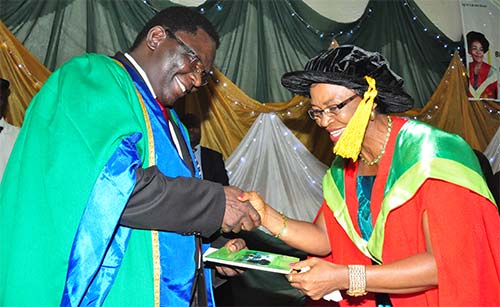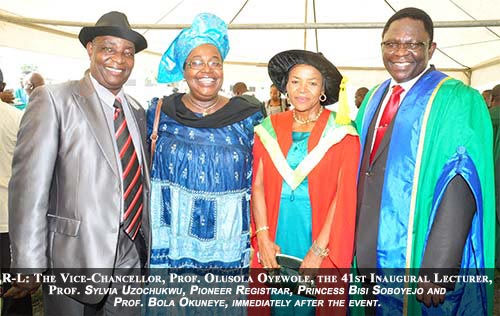
The Vice-Chancellor, Prof. Olusola Oyewole (Left) congratulating the Inaugural Lecturer, Prof. Uzochukwu, after delivering the Lecture.
The University’s 41st Inaugural Lecturer, Professor Sylvia Ajagugha Uzochukwu has warned lovers of cat-fish pepper soup to be cautious of the danger inherent in taking the specie of fish. Delivering the Lecture titled, “Biotechnology Capacity Building: The Gateway to Food Security”, Professor Uzochukwu disclosed that cat-fish lacked the much needed Omega3 oil that is good for health. According to her, people should eat more of Sardine, adding that it contained omega3 oil.
In addition, the University don called for improved food security through biotechnology particularly in Sub-Saharan Africa and Asia, which accounted for almost 90 per cent of the undernourished peoples of the world.
The Inaugural Lecturer also lamented Africa’s failure to join the green revolution, as well as the new gene revolution, as she revealed that spending on agricultural research and innovation was one of the most effective means of investment and sustainable poverty reduction.
Professor Uzochukwu noted that presently, 29 countries in the world have adopted the use of Genetically Modified (GM) crops and stressed that this is acceptable because it offered significant and multiple benefits such as higher yields, less chemicals and labour input, soil conservation and more nutritious food, resulting in increased wealth, cheaper food, cleaner and safer environment and a healthier population.

The Professor of Microbiology and Biotechnology stressed the need for Nigeria to embrace available emerging technologies in agriculture, to produce enough food for her teeming populace, noting that “to do this, Nigeria needs to build up a critical mass of scientists with competence in modern agricultural Biotechnology to drive its various agricultural transformation strategies. Our agriculture cannot be rebuilt for the long term without massive agricultural biotechnology as well as Research and Development (R&D) capacity building.
The don corrected the misconception that genetically modified-foods were not safe, saying that they have been available and consumed for over 16 years with no single report of adverse effects, traceable to any genetically-engineered food. She added that GM foods were more economical and faster to prepare.
Other advantages include helping to increase the levels and availability of desirable disease-resisting and health promoting constituents in food, High Omega3 fatty acid foods, high Oleic acid oils, improve the sensory and nutritional qualities of food, reduce pesticide and herbicide usage among other benefits.
The Professor of Biotechnology advocated that agricultural students should be practically exposed to mechanised farming while leaders of Universities in Nigeria should ensure that grants were properly managed and intellectual property patented. According to her, “knife and hoe farming cannot feed any nation today”.
At the occasion, Professor Uzochukwu offered a Subject Prize for the best undergraduate student in Food Biotechnology in the Department of Food Science and Technology, especially as she described the Lecture a valedictory one for her.
Prof. Uzochukwu is also the “mother of FUNAAB Palm wine, a drink that is always in demand because of the high quality of production, long shelf life and attractive packaging.
Earlier, the Vice-Chancellor, Professor Olusola Oyewole said that she was the first Inaugural Lecturer from the College, adding that the Lecture was the fifth he would be presiding over as the Vice-Chancellor.
